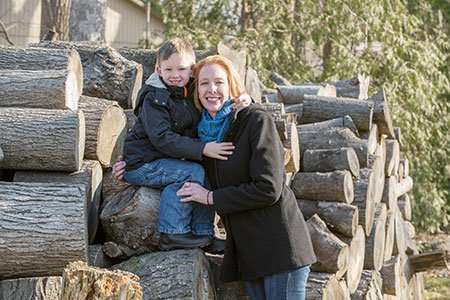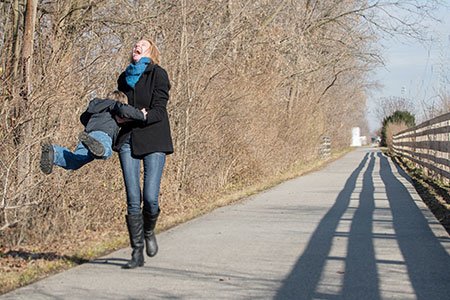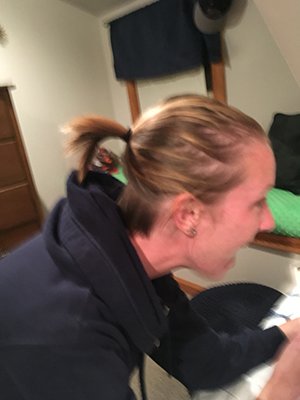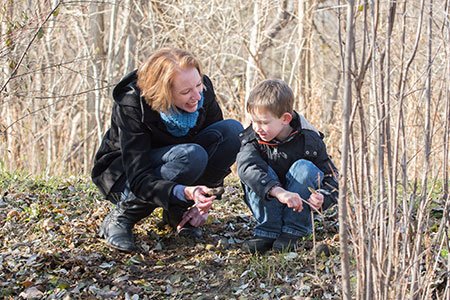Erika's Story
 Erika Lojko was just 35 years old when her world was turned upside down.
Erika Lojko was just 35 years old when her world was turned upside down.
After the unexpected passing of her husband due to a tragic motorcycle accident, Erika was left wondering how she would raise her young son, alone. Little did she know, just over a year later she would be faced with another battle.
In June of 2015 Erika found a lump while shaving in the shower. What would happen if the diagnosis was breast cancer?
It’s enough to cripple some people.
But not Erika.
“You’ve Got This”
Working in the medical field for Macomb County Health, she knew it was best to quickly make an appointment with her primary care physician, Farrah Hafeez, M.D.
Erika had no family history of breast cancer, but her oldest brother was diagnosed with Hodgkin’s lymphoma at 35 years old. Dr. Hafeez referred Erika to a cancer specialist for further testing.
Her mammogram and CAT scan came back negative.
The final test, a biopsy, provided the dreaded results: Stage 3 triple negative breast cancer, an aggressive form of the disease that disproportionally affects African American women and young patients.
From the time of her June 2015 diagnosis through her treatment, she constantly gave herself pep-talks. “I’d tell myself to ‘pull it together’, and ‘you’ve got this!”
The Treatment Plan
Erika quickly assembled her care team to help her tackle this diagnoses: Medical oncologist Lynette Sutkowi, M.D., cancer surgeon Laura Dalla Vecchia, M.D., and radiation oncologist Ibrahim Aref, M.D.
After her case was reviewed by the tumor board, Erika’s team outlined the long-list of treatment options. “There were so many options,” she said.
It was recommended that she have dose-dense treatment followed by multiple surgeries and radiation.
Due to her persistence, Erika was on the fast-track to getting started with treatment.
“Nothing was easy,” she said. “I had twelve biopsies on my breasts because they could not find the main tumor.” Thanks to the ultrasound-guided biopsy they were able to find it.
Erika attended chemo teach, where patients meet with a cancer nurse who provides education and information regarding chemotherapy. Erika admits she did not sustain much of the information because she was still in shock and distracted by thoughts such as “who is going to take my garbage out!?” when the nurse discussed the various limitations.
Cancer may stop you in your tracks…
 As many cancer patients know, cancer may stop you in your tracks but life goes on. Erika had her chemotherapy port inserted the week of her son’s 4th birthday party. This is how life continued for more than a year.
As many cancer patients know, cancer may stop you in your tracks but life goes on. Erika had her chemotherapy port inserted the week of her son’s 4th birthday party. This is how life continued for more than a year.
She started Adriamycin and Cytoxan in August 2015. This form of chemotherapy, also known throughout the breast cancer world as the "Red Devil”, left Erika feeling very sick.
“Every side effect that could happen, happened,” she said. After four rounds of the Red Devil she did 12 rounds of taxol, which took her to the end of the year. Erika remembers spending the day after Thanksgiving in the infusion room instead of Black Friday shopping.
In January 2016, Erika had a double mastectomy with lymph removal. This option gave Erika her best chance of survival due to the fact that there were suspicious cells in both breasts. During the same procedure, she had spacers put in for the breast reconstruction.
“The mastectomy was especially difficult for me,” she said. “I had a hysterectomy the year before and I no longer felt human. My breasts were gone. The doctors kept removing more of my body.”
The process was miserable and uncomfortable. She had drains coming out of her spine and she woke up from the procedure alone.
After six weeks, Erika was healthy enough to begin radiation treatment – 25 rounds – in March 2016. “The radiology nurses were amazing,” she said. “When you feel stripped from your beauty, they give you confidence.”
Erika thought she was done with treatment following radiation, but Dr. Sutkowi recommended oral chemotherapy during a follow-up appointment; tests revealed there were STILL cancer cells present.
So in May 2016, Erika started 12 rounds of the maximum dose of the oral chemotherapy drug Xeloda.
“It was terrible. I experienced hand and foot syndrome, among other side effects,” she recalls.
A few weeks after completing her chemotherapy, Erika was finally ready for breast reconstruction surgery with Vik Reddy, M.D.
She had a great experience with Dr. Reddy and his team, but due to her extreme weight loss, her body couldn’t sustain her new implants.
“I have crooked boobs. And I am okay with that,” she said. “It is a daily reminder that I am still here, I am perfectly imperfect.”
Survival is a verb

Along with her appetite, cancer took away her confidence, her hair, her endurance and her ability to bounce back after any virus or common cold. She endured treatment and made it to all her appointments – while working full-time, paying the bills and for Caleb’s day care, picking him up each day, and keeping the house in order.
The one thing that kept her focused and fighting it all: her son, Caleb. “I’m still here for a big reason: to raise my son and to be a good mom. I’m all he’s got.”
Caleb is now 6 years old and heard his mother’s story for the first time when she spoke at the American Cancer Society’s Making Strides event.
As Erika’s hair began to grow back, the pair set up a new nightly ritual: Checking out see if she could pull her hair into a pony-tail. The night that it finally happened in late 2017, Erika recalls: “We were dancing around and he took my photo.”
They enjoy spending time together in nature, walking through parks and trails finding ‘treasures’. This is where they reconnect to find peace.

“If you want your life back you need to be a warrior,” she said.
Support along the way
The American Cancer Society program, Look Good Feel Better, was very helpful for Erika who enjoyed meeting other moms and grandmas experiencing insecurities with their physical appearance and learning tips for make-up, hair and skin.
In addition, the Henry Ford Game On Cancer initiative provided Erika and Caleb tickets to see a monster truck show at Ford Field. “It was nice to spend time together and do something fun in the midst of it all,” she said.
Tips to Henry Ford Cancer
Erika provided our team with feedback on how to improve our care for breast cancer patients, like herself. Erika pointed out the anticlimactic nature of the last day of chemotherapy. Henry Ford is exploring ways to celebrate and acknowledge a patients final day in the infusion room. In addition, Erika pointed out that the breast cancer support group for Henry Ford Macomb Hospital meets at 2 p.m. on Monday afternoons which did not work for her, as a young working mother. Our team is looking at providing support group opportunities to all breast cancer patients with different start times.
Tips to others
- Do your research, go to appointments with questions. Understand your disease and your options.
- Remember: You are not fighting for a raise or a parking spot – you are fighting for your life.
- Ask about what resources are available to you
.svg?iar=0&hash=F6049510E33E4E6D8196C26CCC0A64A4)

/hfh-logo-main--white.svg?iar=0&hash=ED491CBFADFB7670FAE94559C98D7798)